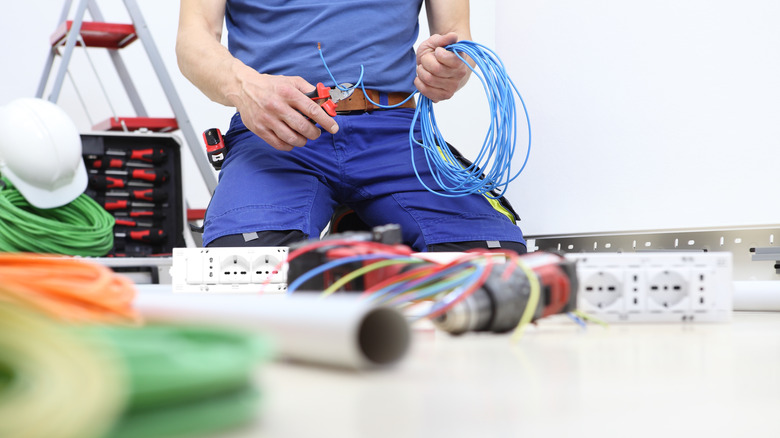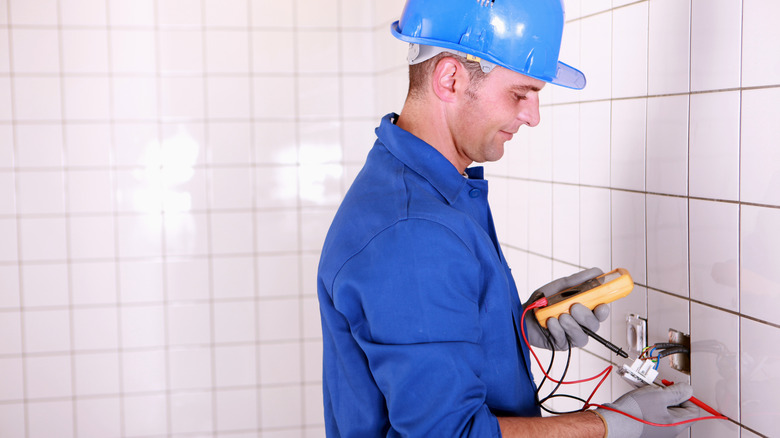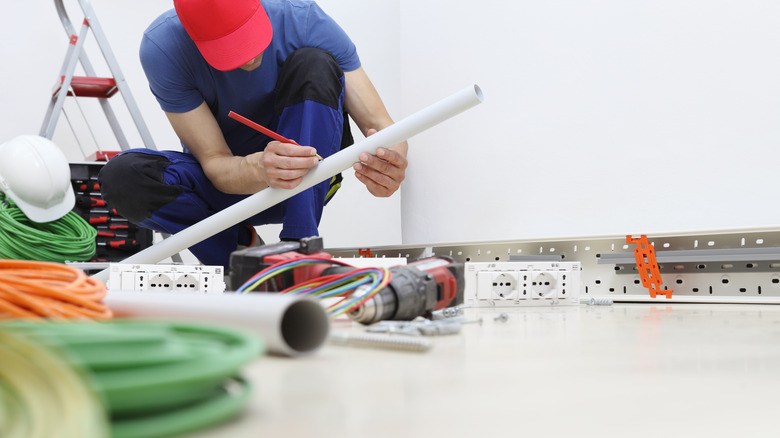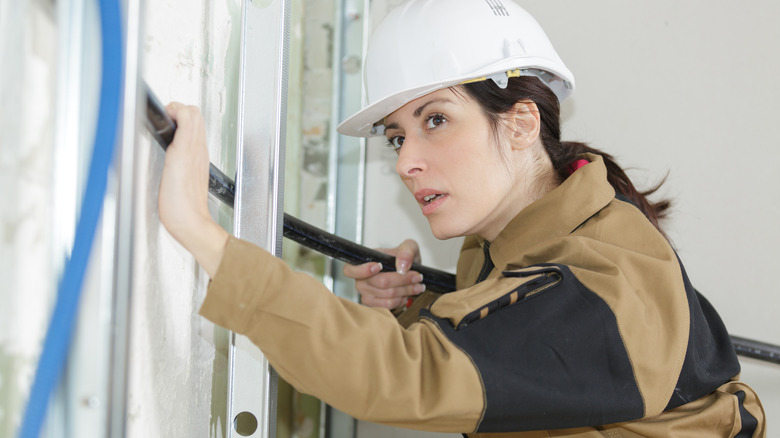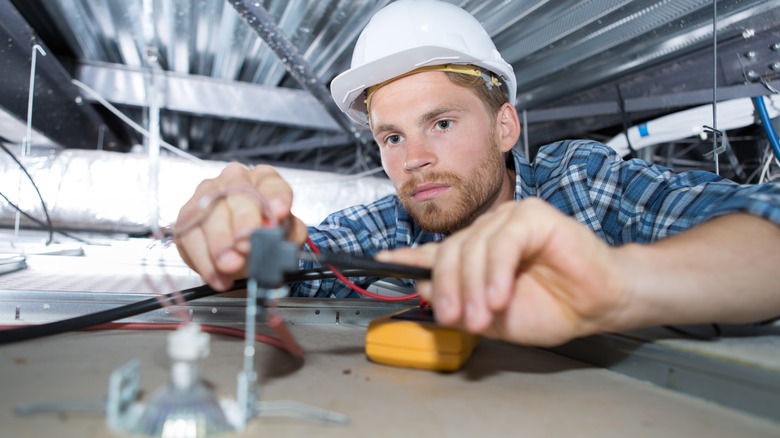How Much Does It Cost To Rewire A House?
There are plenty of reasons for rewiring your home; it could be because it is an older house that needs an upgrade, or it might be because of new power requirements. Modern appliances do come with additional power requirements that your older wiring system might not be able to accommodate. In addition, the insufficient power supply can be quite an inconvenience because of the constant trip breaks making the whole experience undesirable. It is also worth mentioning that old and damaged wiring systems pose fire hazards to any home. So how much does updating the wiring codes in your home cost?
There are plenty of factors that will influence the total price of the project, like the size of your home, the price of the materials, or even the type of your wall. However, according to HomeGuide, it will cost you approximately $2 to $4 or $2,000 to $6,000 to rewire a 1,000-square-foot home. Getting your house rewired involves getting rid of the old and damaged wiring system and replacing them with safer insulated options.
Factors for cost
Again, there are plenty of factors that will determine how much money you will end up paying for rewiring your home. Thumbtack gives a detailed breakdown of these factors below.
The size of the home
It goes without saying that the general size of the house will determine several things that will eventually influence the price, for instance, the number of materials and the labor charges. Also, the size of the residence will determine the number of outlets that should be installed. Bigger homes will require more outlets as compared to smaller homes. As mentioned before, the cost of wiring a 1,000-square-foot home ranges from $2,000 to $6,000; however, bigger places with double the square footage will cost you double the amount as well.
Upgrading the electrical panel
An electrical panel upgrade usually also accompanies a change to the electrical wiring. For many homeowners, the main reason for rewiring their homes is to increase the power supply. Older homes with a 100 amp panel supply lower power than their modern 200 amp service panel counterparts. Remember, not every house needs the 200 amp panel; smaller or older homes can easily get by with the 100 amp service panel. However, if you need this upgrade in your residence, you will pay approximately $1,300 to $3,000.
Age of the home
Older homes pose a greater challenge as far as installing a new electrical wiring system goes. This is a result of the construction process that was used before the age of the dry walls system. What's more, it is very likely that the entire system is damaged and might need a complete overhaul, which might be costly. Older homes with plastered walls make it even harder to reach and fish out the wires. In such a scenario, the contractors will have to make holes through the wall to keep the structure intact. This tedious process is likely to increase the cost of the installation.
Labor, permits, and inspections
The overall scope of the rewiring process will determine how much you will pay for labor. A complicated rewiring process is likely to take longer; therefore, you will pay more for labor. There is no standard for work charges; however, the cost per hour ranges from $65 to $85. And for such installations, getting a permit for the project is a requirement for most buildings. Permit fees range from $200 to $900, depending on your region. You should also be aware that you will need an inspection done right after rewiring to ensure the installation was done to the standard of the building codes. These aspects will add to the expenses.
Additional costs
Just like any other project in your home, you should expect other cost factors that will come your way. Let's have a look at some of the additional expenses you should consider, as noted by Bob Vila.
Opening walls
Right from the jump, if the installation will require tearing through walls just to gain access to the electrical wires, prepare yourself for a bigger quote. In such cases, you will need more than an electrician for this task. You will have to bring in a separate contractor who will open up and repair the walls right after the electrician is done replacing the switches or running new wires. The size of your home in terms of square feet will determine how much you will have to pay for the task. The overall cost for the entire project is anywhere from $3,500 for a 1000 square feet house to $20,000 for bigger homes.
Clean up
Expect a huge mess if the rewiring job requires opening up your home's walls. Inquire from your wall contractor whether the cost of hauling away the debris is included in the overall quote. Most contractors offer this service, but in case they do not, you will need to hire a separate local cleanup team.
The type of upgrade that you need
There is so much that goes into upgrading the wiring system! Depending on the unique circumstances of every home, the necessary upgrades and improvements will vary. For instance, older houses with outdated electrical systems will need a complete overhaul, while newer constructions might only need service panel upgrades. And for this reason, the cost of the upgrades is approximately $555 to $2,281.
Why you need to rewire your house
The electrical system in our homes is usually away from sight, and it is quite easy to forget that it exists. Since house rewiring is an expensive project, it is understandable why homeowners often consider repair instead of a complete system rewiring. So, how do you know it is time to rewire your home? Here are some telltale signs, courtesy of Checkatrade.
Flickering lights
If you are having trouble with flickering bulbs in your home, it may be because of a loose bulb, power inconsistency, or even a wiring problem. Before going ahead and contacting an electrical company to rewire your home, it is wise to try and isolate the problem. First, make sure that your bulbs are fitted properly and that there is no power intermittency from the electrical company. If everything checks out, call in an electrician to identify the root source of the problem; you might be dealing with a faulty wiring system.
Tripping circuit breaker and blown fuses
Circuit breakers and fuses are designed to protect your appliances from a surge in electrical current. However, if the frequency of tripping circuit breakers or blown fuses increases, it could be a sign that your electrical wiring system is not up to scratch. Over time, the structure wears out and can no longer keep up with your home's requirements; hence, the blown fuses and tripping circuit breakers.
Burning smell
You cannot miss the smell of a burning wire; the smell is so distinct and should be a cause for alarm if it occurs frequently. If you suspect the smell is coming from your electrical wiring system, turn off the power and contact your electrician immediately.
Benefits of rewiring your house
By now, you should have a decent understanding of the reasons why you should consider rewiring your house. So let's quickly discuss what you stand to gain from this project, according to Heath Electrical Services.
Provides safety
Rewiring your home ensures that your family and property remain safe from electrical hazards. When wear and tear take its toll on the electrical system, it becomes susceptible to various faults that may pose a danger. In addition, the process of rewiring your home gives you also the opportunity to include other safety features like a smoke detector.
Saves on electricity bills
You might not know this, but a faulty electrical wiring system can be why your monthly utility bill is through the roof. Poor electrical wiring or the impact of time on your wiring may cause an electrical leakage. Rewiring your home will ensure your only pay for what you have used at the end of the month.
Increases property value
If you are thinking of putting your property up for sale soon, one sure way of improving the value of your residence is by rewiring the electrical system. One major selling point for any home is safety, so once you have rewired your place and had an inspection done, your house becomes more appealing to potential house buyers. Besides, no one will pay full price if there is visible electrical damage to your property.
Protects your appliances
Your home appliances are subject to damage if you have faulty wiring systems. Bad wiring will compromise the power supply to your appliances, rendering them inefficient in their operation. In addition, frequent damages to your devices will set you back a couple of dollars in the way of repairs and replacements.
DIY vs. professional service
Right off the bat, it is important to mention that rewiring your electrical system is not a do-it-yourself type of project. In fact, most regions require a permit before going ahead and changing the current wiring of your home. However, if you have prior knowledge and experience in electrical installation, you could save a few bucks for labor. On the other hand, you will spend the same amount of money on materials, and the task is likely to take you longer to complete.
According to Angi, the cost of materials is roughly between $0.25 to $1.60 for every linear foot. Still, it is essential to highlight that an electrician is likely to do a far better job than yourself and also take a shorter time, hence saving you the misery of staying without power any longer than you have to. Also, remember that connecting the electric cables to the service box is part of rewiring and can only be done by a licensed electrician.
